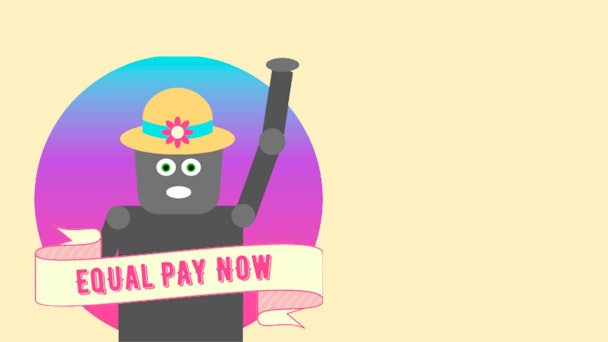Brands beware, the Gender Pay Gap Bot will call you out on International Women’s Day
As brands ready their International Women’s Day comms, we catch up with the team behind the @PayGapApp bot that sent Twitter into a frenzy last year and ask whether anything has changed.

Co-creator says response to bot has been amazing, but little has changed
On International Women’s Day 2022, an anonymous bot appeared on Twitter and began calling out “fluffy” social posts from organizations marking the day, using publicly available data to expose them for their gender pay gaps.
Later revealed to be the brainchild of Manchester-based copywriter Francesa Lawson and her partner Ali Fensome, a software developer, the gender pay gap bot (GPGB) has now amassed 230,000 followers keen to keep up with its work showing the reality of the pay gap within these boastful organizations.
Advertisement
Lawson tells The Drum that reaction to the bot continues to surprise her: “It took a while for its success to sink in and there have been some surreal moments. Since last IWD, we’ve been invited to speak at events and on podcasts, I got my first byline in the Metro and we even got to visit Twitter HQ.”
The bot has also continued to evolve throughout the year, including five-year trend graphs, expanding the keywords it tracks to pick up mentions of ‘equality’ and ‘diversity’, and now including the year-on-year change.
Lawson says it can be a difficult act to juggle the management of the bot alongside running her own business and working on client projects, explaining that last March she rarely logged off before 10pm.
It has, however, been good for business, she adds. “Several clients sought to work with me because of it, especially those in the HR tech, DEI and social impact space. I prefer to work with businesses that share my values, so I’m totally open with clients about the GPGB.”
Advertisement
The response to the bot’s posting hasn’t always been so positive, however. “Last year, we observed a trend where the companies that responded used quite cold, matter-of-fact, corporate language: the antithesis of their original ‘supportive’ IWD messages. The University of Essex, for example, gave a one-line response while Nationwide did a 5-tweet buzzword-heavy thread. The worst response from last year came from Mid Yorkshire Hospitals, though, which accused us of ‘spreading misinformation’ despite the fact it’s its own data!”
This year, Lawson says the bot hasn’t received so many responses. “We’ve only had two companies respond to our tweets,” she says, although the tone of the responses has been quite constructive (which in Lawson’s opinion is the wisest approach for brands that find themselves called out). “Last year, Imperial College London responded best. What was good was how it accepted responsibility and acknowledged that even a relatively small gap still isn’t good enough.”
When it comes to the tone of firms’ boastful social posts, nothing has really changed, says Lawson. “It’s just more employers promoting panel discussions, afternoon teas and profiling ‘inspirational’ women. But the bulk of posts happen on IWD itself, so that could yet change on Wednesday. After March 8, we’ll be comparing which companies tweeted in 2022 with those that tweeted in 2023 to see which, if any, have changed their approach or decided against participating in IWD this year.”
Suggested newsletters for you
Looking to the future, Lawson explains that Twitter’s crackdown on bot accounts could affect the GPGB: “We don’t know when or if our access will change, so the future of the GPGB is a bit uncertain – hopefully we’ll make it past March 8!
“We’ve not looked at replicating this across other platforms yet, but my gut feeling is that it wouldn’t work nearly as well. Employers can’t delete our tweets, but they can hide a comment on their Facebook and LinkedIn posts. And I don’t think newer platforms such as Mastodon have quite taken off enough for brands to jump ship yet, so when the Twitter API changes come in I may end up just tweeting manually.”
The main thing, for now, is that the GPGB is still running. “We’ll keep it going until we get kicked off the Twitter API or until running it becomes unaffordable.”

